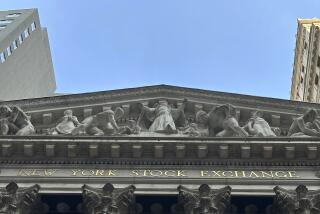Wall Street Firms Steel Against an Uncertain Future
- Share via
NEW YORK — The chairman of Wall Street’s leading trade group peered into his industry’s future three weeks ago, and it didn’t look half bad.
The investment world seemed to have survived the stock market’s Oct. 13 mini-crash, many corporate takeovers were continuing, and Wall Street firms had been “prudent” in trimming their work forces, said Hardwick Simmons, who retires this month as chairman of the Securities Industry Assn. “I don’t think I see another retrenchment ahead.”
It sounded persuasive, but apparently some of Simmons’ colleagues weren’t listening.
In the days since he spoke, there has been word of staff cutbacks and reorganizations from the major firms of Drexel Burnham Lambert, Salomon Bros. and Prudential-Bache Securities, all capped by an announcement by Simmons’ own firm, Shearson Lehman Hutton, that it would lay off 800. This week, Wall Street’s No. 1 firm, Merrill Lynch, notified employees that it is thinking of scaling back some business lines and closing others, moves that are expected to bring layoffs, too.
Industry observers expect cutbacks in relatively small numbers over the next year, perhaps totaling several thousand. Some foresee the current travail leading to long-term changes, perhaps including the buyouts of some weaker firms by stronger ones, as well as radical changes in the compensation plans that have richly rewarded so many in this decade.
“This is a cyclical business; you can at least say that this part of the cycle does not look good,” said Lewis Glucksman, a vice chairman of Smith Barney, Harris Upham & Co.
Wall Street’s problems have been brewing for some time. The pace of stock market trading has not recovered fully from the October, 1987, crash. Many individual investors have been staying away from the markets since that shock; last month’s 190-point drop on the Dow Jones industrial average was a further blow to public confidence.
Issuance of new stock and high-grade bonds is off. Since early this summer, there has been a weakening of the market for high-yield junk bonds, which provide huge underwriting fees for the big investment banks and have made possible the highly leveraged takeovers that have also been a rich source of fees for the big firms.
Investment houses that have propped up their profitability from these sources since the 1987 crash have been pinched as junk underwritings and junk-financed takeovers have slowed. In addition, some firms have suffered losses in takeover-stock speculation, or arbitrage.
“Industry revenues have been stagnant for three years,” said Jeffrey Schaefer, director of research for the Securities Industry Assn. “The slowdown in junk bonds and mergers and acquisitions has been the last straw, and now the firms are having to re-evaluate their lines of business. That’s the significance of the latest announcements.”
There have been some indications of the industrywide profit problems. For the first half of the year, pretax profits for members of the New York Stock Exchange totaled $800 million, down 38% from the $1.1 billion earned in the first of 1988. NYSE members earned $2.5 billion last year and $5.5 billion during Wall Street’s peak year of 1986.
And many on Wall Street are fretting about what will happen if the economy slips into a recession, as many analysts now expect.
Merrill Lynch’s approach may typify some of the soul-searching now under way.
In a letter to employees signed by Chairman William A. Schreyer, the firm cited industry overcapacity and intensified competition, including pressure from such new sources as commercial banks and foreign firms. “Many of these changes are not short term or cyclical in nature. They are fundamental and will not go away as the business cycle turns,” the letter said.
Merrill said it planned to restructure or eliminate businesses that weren’t yielding a satisfactory return, and it will trim some investment bankers’ bonuses. Merrill saw earnings decline 38% in the third quarter, to $41 million, from the year-earlier period.
At least two firms are rethinking their recent expansion into the lucrative but highly competitive world of investment banking. Prudential-Bache Securities, strong on securities sales to individual investors, says it expects money to be harder to make in investment banking, and it will cut back in that area.
Salomon Bros., the bond trading powerhouse, says it is dismissing 100 executives, with fewer than half from the investment banking area.
The most striking recent announcement has come from Shearson. In addition to its expected layoffs of 800, the company will cut back commissions for brokers for the first time in 15 years. And ahead is a management shake-up in which a new crop of executives is expected to gain power and Shearson’s president, Jeffrey B. Lane, is expected to be given a reduced role.
Drexel, the traditional leader in junk bonds, has been hard hit by the contraction of that business. The firm, which shrank to 65,000 employees from 98,000 earlier this year as it sold off its retail arm, is in the midst of laying off 300 more. The cuts are from all departments, a spokesman said.
Though the recent flurry of cutbacks has been dramatic, the moves appear more modest when measured against the rapid expansion of Wall Street over the past decade. Total employment in the industry shot to a peak of 261,000 just before the crash, from 140,000 at the end of 1980, according to the SIA. At the end of June of this year it was 229,000.
Analyst Samuel Liss of Salomon Bros. noted that even the most dramatic cutback--Shearson’s 800--does not seem so large when considered in light of the company’s total work force of 38,000.
Still, the danger may lie not in what has happened in the past several weeks but what these events suggest about the future. “It doesn’t look like some of these things are going to turn around in a hurry,” says Smith Barney’s Glucksman.
More to Read
Inside the business of entertainment
The Wide Shot brings you news, analysis and insights on everything from streaming wars to production — and what it all means for the future.
You may occasionally receive promotional content from the Los Angeles Times.











